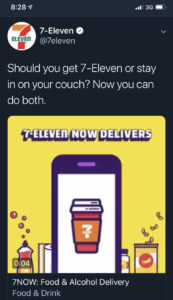Cashflow management advice for newsagents and other small business retailers
In my work with newsxpress I prepared and shared this cashflow management advice. I share it here to offer an example one type of business advice (of many) provided by newsXpress and for the advice itself.
CASHFLOW ADVICE FOR YOUR CONSIDERATION.
In it’s simplest form, cashflow management is about ensuring a business has the cash necessary to meet its obligations and, hopefully, build reserves for the owners.
Good cashflow management starts with the understanding that this is your business. You sign the lease. You sign up for any loans. You hire, train, motivate, manage and, maybe, fire the staff. You choose what you sell. You set your prices for most of what you sell. You control how the shop looks. You manage the promotion of the business outside the business. Yes, this is your business.
The cashflow of the business is a product of your choices.
It is critical for every business owner to own their business cashflow performance. Blaming others or external factors is a cop out. harsh as it is, that’s the truth.
MANAGING CASHFLOW.
This list is ordered by priority.
- Budget. Have one. Until you do, do nothing. This is priority #1. The budget should include an inventory spend allowance, so you know what you can spend. Plan the budget for the business to be profitable / viable without the need for agency to support it. Business budgeting should involve provision to grow savings / emergency funds without having to borrow / lifestyle choices / exit strategy if you cannot sell the business.
- Funding. Before you borrow from any source, get advice as to the appropriateness of this funding. Too often we see expensive, unsecured, loans taken out at ridiculous interest, to the significant cost and harm to the business.
- Shop lease. Only sign a lease you are happy with. Be prepared to walk away at the end of the current lease if the new one offered is not good. Run your business through the life of the lease as if you will not take up a new lease in the same location.
- Labour costs. Run a lean roster. $25.00 a day saved in labour costs is like $50 to $75 in retail sales. That is, $15,600 to $23,400 in revenue for a six day week over a year.
- Ensure every team member has a role description.
- Set business performance targets:daily revenue / revenue per labour hour or similar. It is critical everyone working in the business understands the goals and that they support them.
- Price for margin. Understand retail price psychology. For example, $13.50 is seen to be the same as $14.99. So, price at $14.99. By pricing to a higher price point you can discount back or fund a loyalty program that discounts for loyalty. Also, choose .99 over .90 or .95.
- Loyalty. Run a loyalty program that focusses on people shopping more often with you. Be consistent in your pitch. Do not waver over the offer. It rewards loyalty, not laziness. The focus on loyalty needs to be whole of business, whole of team in pitch and management.
- LayBy. Stop it. Instead, offer Oxipay, ZipPay or AfterPay.
- Basket depth. Maximise every touchpoint.
- Counter. Always have multiple offers at your counter, offers that are easily purchased on impulse, offers that deepen the basket and make a shopper visit more efficient for you.
- Top selling items. Look at what is on either side. Make sure the products are relevant and easily purchased with the popular item.
- Exit pitch. Make sure you have a compelling and regularly changed pitch to shoppers as they leave the business.
- Inventory.
- You control your buying. Not a rep of a supplier ordering on your behalf.
- A full shop is not necessarily a good shop. A smart shop is better. This is, one that people love to browse, love to shop. Often in retail less is more.
- Consider establishing a buying approval process where more than one person participates in buying decision. The goal is to slow impulse purchases. This could be someone outside the business.
- If you doubt your ability ton pay, don’t buy.
- Move, move and move. Every day there should be movement of products in the sore to keep it feeling fresh.
- If products don’t work, quit them as they are worthless if you put them in storage for later.
- Work with suppliers, exploring delayed terms or consignment opportunities.
DEALING WITH A CASHFLOW CRISIS.
A cashflow crisis is when you can’t pay your bills on time or a sustained period of dissatisfaction with the cash reserves in the business.Too often, small business retailers ignore a cashflow crisis, leaving action until it is too late.
Here is our advice on how to deal with a cashflow crisis.
- Own the problem. Fixing this is on you.
- Bring in outside help. This could be a friend, a financial counsellor. The best person will be someone who understands your type of business who can help you see what you don’t see and support you in tough decisions to be made.
- Understand the problem. Know if it is short term or long term. Be certain about the role you have played.
- If you run customer accounts, collect with urgency.
- Ask the landlord for immediate rent relief. The more transparent you are with them the better. Document your case. Be prepared to show your P&L in support of your request.
- Cut your roster to bare bones.
- If you have stock on sale or return and it is not selling, return for credit.
- Immediately start a sale.
- Give it a cool, non scary, name.
- Price items to sell, especially items for which you have already paid. Even selling below cost frees cash to the business.
- Get everything on the shop floor.
- Display to clear. i.e. not pretty displays for sale items.
- For inventory that you cannot sell, consider eBay.
- Consider selling assets. If you have equipment in the business that you no longer use, sell it.
- Talk to all your creditors, apologise, outline your plan, ask for help.
- When making progress payments on creditors, respect all with payments. NOTE: small regular payments could be key to you not facing debt collection action.
- Act.Every decision, every action you take must work to addressing the cashflow challenge. If you have created a plan act on it immediately. This is not a time to overthink things.
- Invest.If your cashflow challenge is because of a decline in traffic, not spending money chasing traffic will only make the problem worse. Spend carefully.
- Plan for the end point. This will be either coming out on top or closing the business.
The cashflow achieved by a business is a product of your decisions. Be thoughtful in each decision and single-minded in your focus on a better cashflow outcome.
Thanks for reading. We hope 2019 is awesome for you.
Mark Fletcher
Managing Director
Tower Systems International (Aust.) Pty Ltd
E | mark@newsxpress.com.au.











